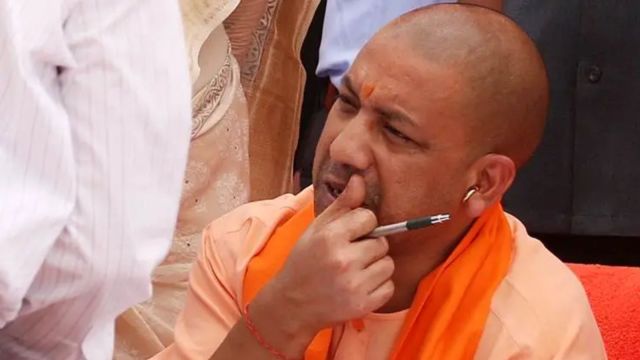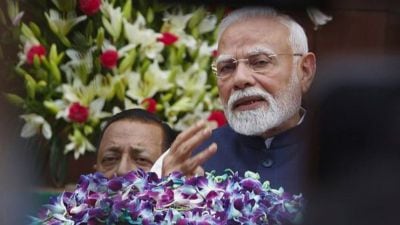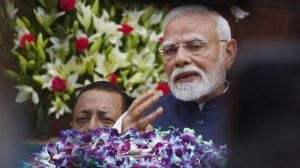‘From Bimaru state to India’s growth engine’: Yogi presents report card of his govt’s 8 years
The state is poised to become number 1 economy soon from the second-largest in the country, says the Chief Minister.
 UP CM Yogi Adityanath
UP CM Yogi AdityanathChief Minister Yogi Adityanath claimed on Monday that Uttar Pradesh which once carried the tag of a ‘Bimaru’ state has transformed into the growth engine of the Indian economy and the entire country now acknowledged its emerging identity in the areas of security, good governance, prosperity and Sanatan culture.
Presenting the report card of the eight years of his government at a press conference in Lucknow, the CM, accompanied by his Cabinet colleagues, said, “Uttar Pradesh is moving forward on the path of transformation from a ‘shram shakti punj’ to ‘arth shakti punj’ of India. The perception about the state has completely transformed over the last eight years.”
‘Bimaru’ is a pejorative used for the states of Bihar, Madhya Pradesh, Rajasthan and Uttar Pradesh.
Announcing a three-day ‘Vikas Utsav’ at all district headquarters starting March 25, Adityanath said farmers, youth, women, artisans and entrepreneurs will be honoured during the event and the development milestones of 10 years of the Central government and eight years of the state government will be showcased to the public.
Currently the second-largest economy in the country, the state is poised to become number one soon, he claimed.
Before 2017, the state’s identity was in a “deep crisis”, Adityanath claimed, adding, “Farmers then were committing suicide, the youth was searching for a purpose, daughters and businessmen felt unsafe and riots and lawlessness crippled the economy. But in the last eight years, the double-engine government transformed that perception. Today, UP is leading in every sector, becoming a force in the nation’s growth.”
Claiming law and order as the “biggest achievement” of his government, the CM said, “Before 2017, riots were a regular occurrence. Daughters and traders lived in fear. Today, there is a clear rule of law in Uttar Pradesh.”
Citing the Maha Kumbh in Prayagraj as an example of effective governance, Adityanath noted that not a single incident of molestation, robbery, or kidnapping was reported during the 45-day event.
Noting that Uttar Pradesh has always been a leading agriculture state with abundant fertile land and water resources, he said, “But before 2017, the condition of farmers was bad. One of the first major decisions of our government in 2017 was to waive loans of small and marginal farmers, worth Rs 36,000 crore. As a result, food grain production increased from 557 lakh metric tonnes in 2016-17 to 668 lakh metric tonnes in 2023-24 — a 20% rise.”
Highlighting his government’s “achievement” in employment creation, Adityanath said, “The unemployment rate, which was 19% in 2016-17, declined to just 3%. Over the past eight years, more than 8 lakh government jobs have been provided, and over 2 crore youth have been empowered through self-employment in the MSME sector. Furthermore, 50 lakh youth have been made digitally enabled through the distribution of tablets and smartphones. With 96 lakh MSME units, Uttar Pradesh leads the country in this domain.”
Over Rs 10 lakh crore has been transferred directly to beneficiaries through direct benefit transfer (DBT), he further said.
“Long-pending irrigation projects such as Arjun Sahayak, Bansagar, and Saryu Canal were completed, bringing irrigation to an additional 23,000 hectares. Leveraging the expertise of Krishi Vigyan Kendras, new agricultural universities, and modern technology, UP has emerged as a leader in the production of paddy, wheat, pulses and millets,” he said.
Claiming a turnaround in the sugarcane sector, the CM said from 2008 to 2017, sugarcane farmers were burdened with unpaid dues running into thousands of crores. “Our government ensured that not a single sugar mill was shut down, and at the same time, opened three new mills, revived six, and expanded 38 others,” he said.
Between 2017 and 2025, Rs 2.80 lakh crore has been paid to sugarcane farmers — Rs 60,000 crore more than the total paid in the previous 22 years, he pointed out, adding that ethanol production has also surged, growing from 42 crore litres to 177 crore litres.
“In 2017, there were 1.5 lakh vacant police posts. Through a transparent recruitment process, the government appointed 1,56,000 police personnel and recently added another 60,200. There were no police lines in 10 districts — today, we’ve built them in every district. Training capacity for police personnel has increased from 6,000 to 60,244,” the CM said.
While the previous governments had abolished 54 companies of the PAC (Provincial Armed Constabulary), his government reinstated them, he added. “Additionally, three women battalions and five new PAC battalions were established. Cyber police stations and help desks were set up, and the response time of police response vehicle (PRV) 112 was brought down from 25.42 minutes to just 7.24 minutes. The “Safe City” project has taken shape with the installation of over 11 lakh CCTV cameras, ensuring greater surveillance and public safety,” he said.
Highlighting the transformation in women’s representation in the police force, he noted that from 1947 to 2017, there were only 10,000 women personnel. In recent recruitments alone, 12,000 women were added, taking the total to over 25,000. As a result, the share of women in the police force has increased from 14% to over 35%, the CM said.
Through the BC Sakhi initiative, banking services are now available in 57,000 gram panchayats, he shared. Also, 1 crore women have become self-reliant by joining self-help groups (SHGs), he said.
“The One-District-One-Product (ODOP) scheme revitalised traditional industries and entrepreneurship, with exports rising from Rs 86,000 crore to over Rs 2 lakh crore. Under the Mukhyamantri Yuva Udyami Vikas Yojana, the target is to create 1 lakh new entrepreneurs by March 31. Young entrepreneurs are being provided interest-free, collateral-free loans up to Rs 5 lakh. Artisans are also being supported through skill development and toolkits under the Vishwakarma Shram Samman Yojana,” he said.
On educational reforms, the CM noted that cheating in exams, once seen as a norm, has now been eliminated through transparent and strict practices. “Enrollments in Basic Education Council schools have increased by over 50 lakh. Every child receives Rs 1,200 for uniforms, school bags, books, shoes, and sweaters. Schools have been upgraded with facilities such as toilets, clean drinking water, digital libraries, and proper flooring,” he added.
“Several new higher education institutions have also been established, including state universities, a medical university, an Ayush university, and an additional agriculture university each in six commissionerates. Ten new state universities and 21 private universities have been established. The Mukhyamantri Abhyudaya Coaching Scheme has been launched in every district, providing free guidance for competitive exams. Additionally, 100% scholarships are now being given to students from Scheduled Castes, Scheduled Tribes, and OBC categories,” the CM said.
Over the past eight years, more than 6 crore people have been pulled out from poverty in Uttar Pradesh, he said, highlighting that 15 crore people have been receiving free ration consistently for the last five years. Additionally, 1.86 crore Ujjwala connections have been provided, with free LPG cylinders being distributed on festivals like Holi and Diwali, he said.
“Under the Ayushman Bharat Yojana, 9 crore people have been issued “Golden Cards” for health coverage. Furthermore, housing has been provided to 56 lakh underprivileged families,” he said.
On social welfare, the Chief Minister noted before 2017, around 55 lakh destitute women, senior citizens, and divyangjans received pensions. “Today, this number has grown to 1.06 crore, and the pension amount has been increased from Rs 300 to Rs 1,000.”
The CM reaffirmed the government’s commitment to achieving the goal of zero poverty in the upcoming financial year.
Expressing his gratitude to Prime Minister Narendra Modi, Defence Minister Rajnath Singh, Home Minister Amit Shah, BJP president JP Nadda, his cabinet colleagues and NDA constituents for their “continuous support”, he credited the state’s journey over the past eight years to a “collective spirit of teamwork, scale and skill”.












